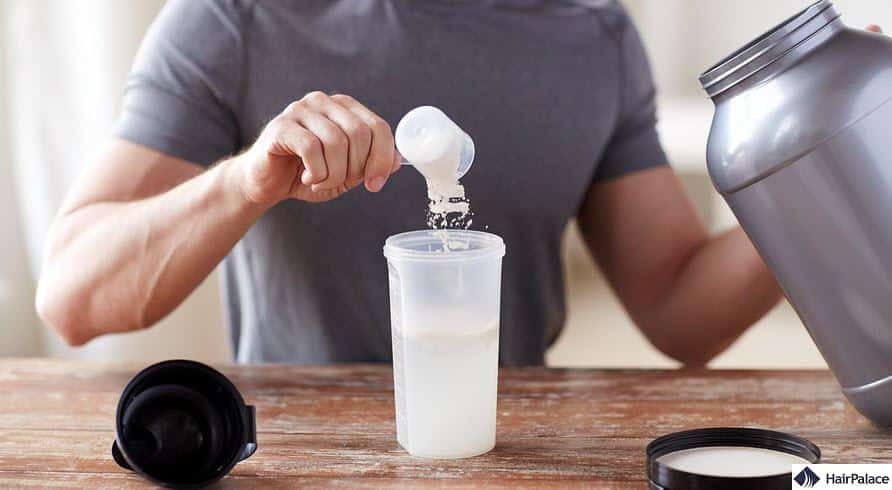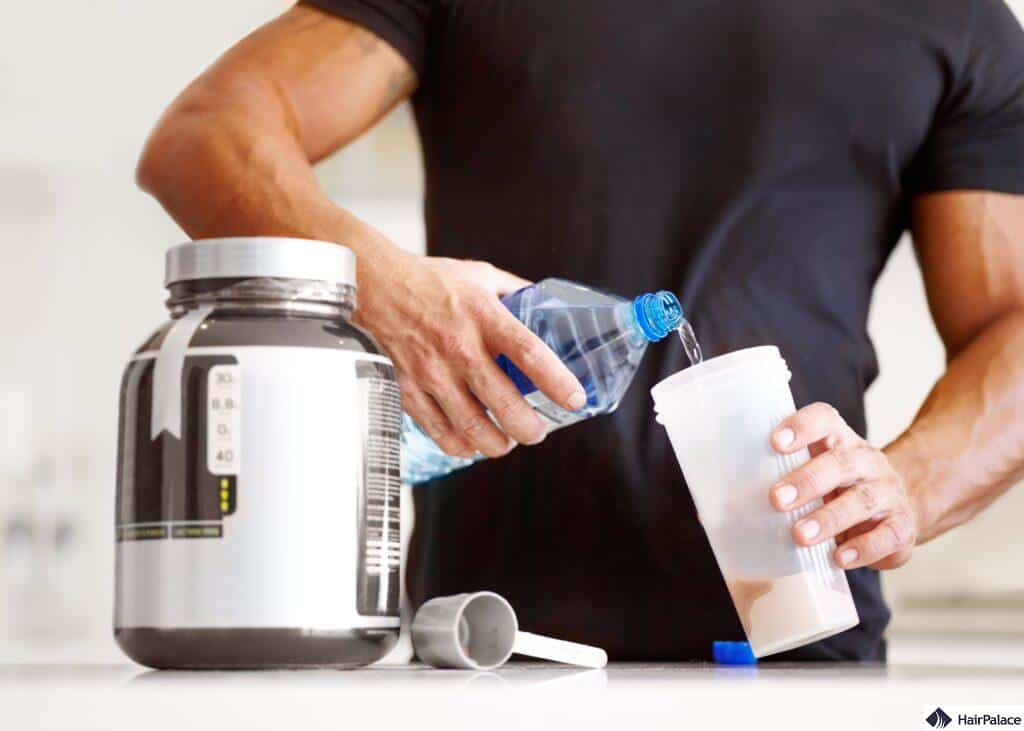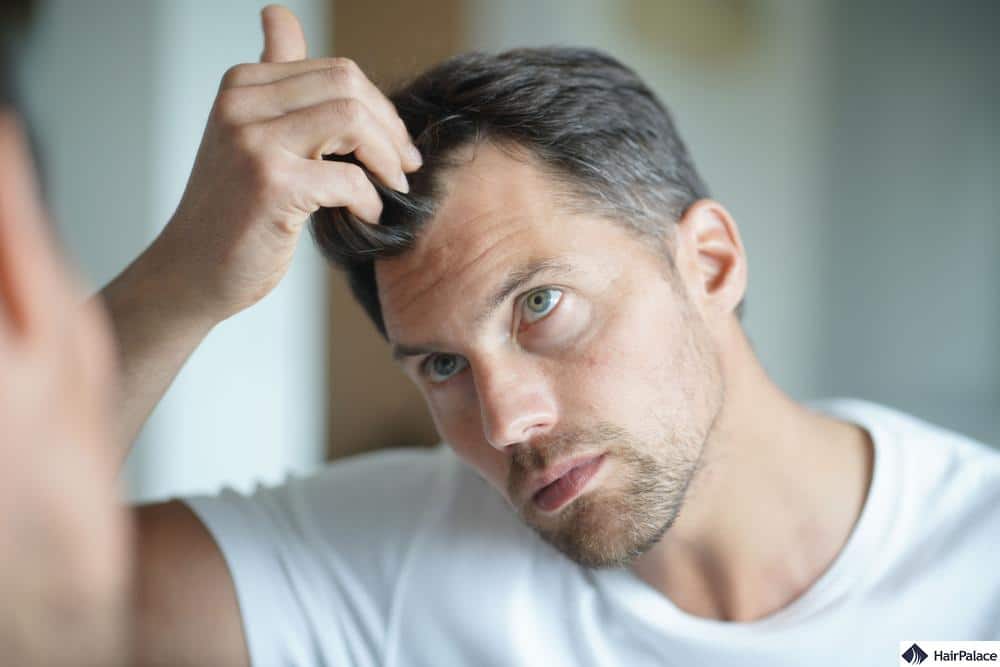Does Creatine Cause Hair Loss? The Truth in 2025

Creatine is one of the most popular supplements for muscles, fitness, and energy.
Used by athletes worldwide to improve their performance and get gains quicker, there are over 500 clinical trials that can examine the effects of creatine closely.
But like any supplement, it has pros and cons, and one of the growing concerns of creatine users is its possible connection with hair loss.
Some studies suggest that creatine may increase dihydrotestosterone (DHT) levels, a hormone linked to hair loss, particularly in individuals predisposed to androgenetic alopecia.
Today we’ll uncover what research actually says about whether creatine negatively impacts hair growth or not and, ultimately, if it’s the right supplement for you to take.
What is creatine?
Creatine is a natural compound found in the body.
It helps recycle Adenosine triphosphate (ATP), a form of energy our cells use to function optimally.
Up to 90% of creatine is stored in our skeletal muscles, making creatine an ideal ingredient for building lean muscles.
After all, with more creatine in our system, our cells have more energy and continue to perform even during high-intensity exercise and sport.
Additionally, they recover from fatigue more quickly.
While our body can create and store creatine naturally, and foods like red meat and fish are rich in the compound, quite often, this is too low for optimal fitness performance.
If an athlete wants bigger results faster, taking the supplement in the form of creatine monohydrate can be the easiest, most effective way of boosting levels.
But, like any other supplement, taking creatine has pros and cons.
Although it makes it easier to build leaner muscle, recover from fatigue quicker, and boost concentration and memory, there are some side effects to be mindful of.
Creatine supplements can have adverse effects on hormone levels, so they may not be suitable for everyone.

Does creatine cause hair loss?
We’ll be clear and upfront with you from the offset – there is little indication that creatine hair loss is a thing.
Much if not all evidence that tries to support these claims is anecdotal and so varies from person to person.
Though some studies have tried linking creatine and balding, their methods throughout their investigation may have skewed results.
We need more research to reach an informed opinion on whether creatine is causing hair loss.
For now, most researchers say that creatine is a perfectly fine, healthy, and beneficial supplement.
Increased levels of DHT
The suggestion that creatine leads to hair loss stems from a study conducted back in 2009 involving 20 college-aged rugby players.
Players were put on a creatine supplement regimen with a 7-day creatine loading phase.
Following that, they underwent a maintenance period with lower dosages.
The results showed increased levels of the hormone DHT (dihydrotestosterone) in the body during the loading phase.
DHT is often connected with premature hair loss, including male pattern baldness.
In the study, DHT levels remained higher than average in players following the maintenance period.
Because of this increased presence of DHT, researchers concluded creatine was a catalyst to promote hair loss.
But researchers failed to examine and assess hair loss after creatine usage in players and only noted their hormone levels.
For that reason, we cannot say with any certainty how or if it really affected the player’s hair.
Furthermore, the study failed to use a placebo group, meaning we cannot treat their findings with total confidence as we can other scientific and clinical trials.
How DHT affects hair follicles
Although the 2009 study suggested that creatine causes hair loss, it poses some critical questions about creatine supplementation, increased levels of the hormone DHT, and their overall impact on hair follicles.
DHT is a male sex hormone that many researchers recognize as the culprit behind early hair loss in both men and women.
It negatively affects a hair follicle’s natural life cycle by binding to the follicle and reducing its hair growth phase.
The result? Hair grows thinner, weaker, and shorter.
Hair will also fall out earlier than average, and follicles fail to replace hair strands in time, leading to thinning and hair loss.
While DHT is an important, natural sex hormone in puberty, it is much more potent than testosterone and can adversely affect other bodily functions in adulthood.

Benefits of creatine supplements
1. Increases energy levels
Creatine supplements can increase phosphocreatine stores (ATP energy), which are used to power our cells.
For this reason, many people take supplements to help during high-intensity exercise and train for more extended periods.
Some studies show an increase in performance of up to 15%, suggesting you can work out harder and for longer under its effects.
2. Improves lean muscle mass
Creatine can inhibit a hormone known as myostatin, which regulates and limits muscle size, preventing it from growing too large.
With creatine supplements, your muscles are allowed to increase in size.

3. Help with Parkinson’s disease
Parkinson’s disease results from a loss of nerve cells in the brain; nerve cells are responsible for creating dopamine.
Dopamine is an all-important neurotransmitter in the cell that helps us feel pleasure and motivation.
Some studies have found that increased creatine levels in the body led to a 90% increase in dopamine production, but there are some caveats.
Namely, the test subjects were mice, so how creatine affects human brains is still being examined.
4. Help with Diabetes
Researchers have found that creatine can help reduce blood sugars in the body by preventing them from entering your muscles.
This may help to prevent diabetes from taking hold or potentially alleviating its progression.
However, more dedicated studies are required to say this conclusively.
5. Help prevent neurological disorders
The presence of creatine may slow the progression of neurological disorders like Alzheimer’s disease and protect you from traumatic brain injury.
This is because it increases phosphocreatine levels in your brain, which is usually lacking in these conditions.
One study on mice found that creatine can increase levels by 26-72%.
6. Stimulates brain function
Creatine may also improve brain function.
Increased creatine results may lead to increased amounts of ATP in your brain, improving brain function, including concentration, memory, and problem-solving.
Additionally, increased ATP can increase dopamine, that “feel-good” chemical that enhances your mood and mental state.
Potential side effects of creatine supplementation
As we know, there are many benefits to taking creatine supplements.
However, you must also realize that there are potential side effects and safety concerns to consider.
Below we will address the most common concerns and whether or not they warrant your attention.
1. Increased water retention
Creatine draws water into your muscle cells, which may lead to water retention.
This, in turn, results in increased weight gain, potential dehydration, and cramps.
That said, some research has examined if this water retention has a negative impact or not.
A 2003 study, for example, examined creatine usage in college football players and found it didn’t lead to significant cramping or injury.
Another study in 2009 study creatine did not adversely affect fluid balance or heat tolerance.
2. Kidney disease
Some people have concerns that creatine may damage kidneys, but a study in 2018 found the supplement did not affect kidney function.
3. Long-term effects still inconclusive
The International Society of Sports Nutrition states that creatine is completely safe to take as a supplement, so long as you stay to the appropriate dosage.
A statement from 2017 said it was “safe, effective, and ethical.”
But it must be said that not many studies have looked at the long-term effects, including hair loss.
Only in time will we learn more about this – but for now, the evidence points to creatine causing no major health problems.
4. Potential dangers for teenagers
A lack of studies examining the suitability of creatine supplements for teenagers leads many to wait until adulthood to begin their course.
If in doubt, discuss your concerns about the side effects of dietary supplements with your doctor.
Conclusion
As we’ve explained, creatine is a hugely beneficial supplement that can transform your workouts and improve muscle mass and fitness, as well as energy levels and mental alertness.
Most researchers agree that taking this supplement in the form of creatine monohydrate is entirely safe.
But does creatine cause hair loss?
Only one study has approached the connection, and even then, its results cannot be relied on with total certainty.
Therefore, we believe you can take creatine supplements without concern for hair loss.
If you’re still unsure about taking a dietary supplement and worried if creatine cause hair loss, you should discuss these concerns with your doctor.
Creatine Hair Loss FAQ
Research has shown that there may be a link between creatine and the levels of hormones in your body, namely testosterone and DHT. For example, one study in North America showed that participants who took a creation supplement daily for ten weeks significantly increased their resting testosterone levels. Whether this resulted in hair loss, though, is uncertain.
There is limited evidence suggesting a potential link between creatine and hair loss. However, definitive proof is lacking.
No definitive evidence suggests that creatine causes hair loss in females. However, as with any supplement, individual reactions may vary.
Creatine isn’t known to contribute to hair loss. If you attribute your hair loss to creatine usage, you most likely suffer from an underlying condition that causes you to lose hair. It’s best to get a diagnosis from a doctor to find out whether your hair loss is reversible.
If creatine contributes to hair loss, and it’s due to male pattern baldness, the loss is typically permanent. If not, hair might regrow after discontinuing the supplement.
Creatine is unlikely to have any effect on your hair loss pattern.
If creatine contributes to hair loss by temporarily increasing DHT levels, the shedding is usually reversible after stopping supplementation. Hair typically regrows once hormone levels and the hair growth cycle normalise.
Some studies suggest creatine may slightly raise dihydrotestosterone (DHT) levels, a hormone linked to hair loss in genetically predisposed men. However, evidence is limited and not conclusive.
There is no strong scientific proof that creatine directly causes hair loss. The concern comes mainly from a small 2009 study, and most research since has found no consistent connection.
Last medically reviewed on October 13th, 2025
- Butts J, Jacobs B, Silvis M. Creatine Use in Sports. Sports Health. 2018;10(1):31-34.https://doi.org/10.1177/1941738117737248
- van der Merwe J, Brooks N, Myburgh K. Three Weeks of Creatine Monohydrate Supplementation Affects Dihydrotestosterone to Testosterone Ratio in College-Aged Rugby Players. Clinical Journal of Sport Medicine 19(5):p 399-404, September 2009https://doi.org/10.1097/JSM.0b013e3181b8b52f
- Urysiak-Czubatka I, Kmieć M, Broniarczyk-Dyła G. Original paperAssessment of the usefulness of dihydrotestosterone in the diagnostics of patients with androgenetic alopecia. Advances in Dermatology and Allergology/Postępy Dermatologii i Alergologii. 2014;31(4):207-215. https://doi.org/10.5114/pdia.2014.40925
- Hawkins, Vivian N et al. “Effect of exercise on serum sex hormones in men: a 12-month randomized clinical trial.” Medicine and science in sports and exercise vol. 40,2 (2008): 223-33.https://doi.org/10.1249/mss.0b013e31815bbba9


